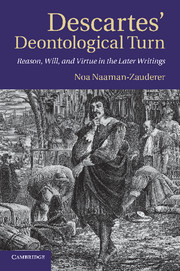Book contents
4 - Free will and the likeness to God
Published online by Cambridge University Press: 10 January 2011
Summary
IN THE IMAGE AND LIKENESS OF GOD
Continuing the task I embarked on in the preceding chapter, I now turn to investigate the Cartesian doctrine stating that, from among all our mental capacities, it is by virtue of the will that we understand ourselves to be godlike. In the Conversation with Burman, Descartes argues that “the will is greater and more godlike than the intellect” (CB 31 = AT v 159: CSMK 342). As he explains to Queen Christina, although the goods of the soul include both the power of knowledge and the power of the will, “knowledge is often beyond our power; and so there remains only our will, which is absolutely within our disposal” (November 20, 1647, AT v 83: CSMK 325). He then concludes: “free will is in itself the noblest thing we can have, since it makes us in a way equal to God and seems to exempt us from being his subjects; and so its correct use is the greatest of all the goods we possess” (AT v 85: CSMK 326). This theme is also prominent in the Passions of the Soul, where Descartes asserts that our free will “renders us in a certain way like God by making us masters of ourselves” (art. 152). And in the Fourth Meditation, as noted, he states that “it is above all in virtue of the will that I understand myself to bear in some way the image and likeness of God” (AT vii 57: CSM ii 40).
- Type
- Chapter
- Information
- Descartes' Deontological TurnReason, Will, and Virtue in the Later Writings, pp. 131 - 148Publisher: Cambridge University PressPrint publication year: 2010



